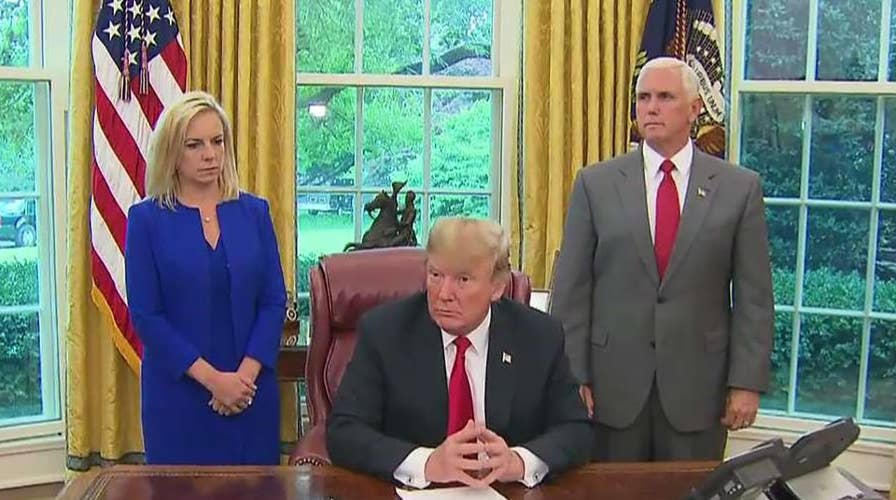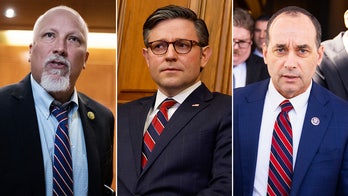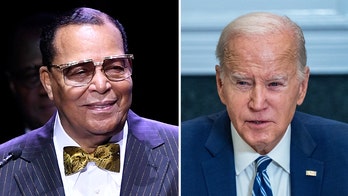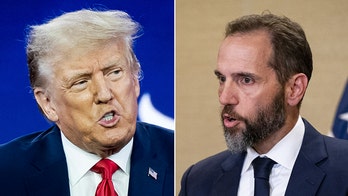Trump signs order to keep families together at border
President Trump and Vice President Pence speak after Trump signs executive order to let immigrant families stay together after crossing the U.S. border.
**Want FOX News Halftime Report in your inbox every day? Sign up here.**
On the roster: Like Bush and Obama, Trump gets stuck on immigration - Time Out: Confidence and cooperation - Poll shows Manchin starts with narrow lead - Giuliani questioned in leak probe - Life, liberty and the *checks notes* tickling of catfish
LIKE BUSH AND OBAMA, TRUMP GETS STUCK ON IMMIGRATION
Aren’t summer re-runs the worst?
At this point in June 2007, Congress was lumbering its way toward inevitable failure on immigration legislation. In June of 2013, the topic in Congress was the same, and so was the outcome.
So guess what Congress is getting ready to do this week?
President Trump learned today the same lesson that both of his most recent predecessors found out in similarly painful fashion. The country is eager for solutions on immigration but the two parties are not.
Trump retreated today from his policy of separating children from parents who arrived in the United States illegally seeking asylum. Under an executive order, the administration will still pursue its “zero tolerance” policy for those who cross the border illegally, but will no longer take children away from their parents as families go through the legal process.
How all this works and whether it can pass legal muster remains to be seen, but it is at the very least an acknowledgement from the president that his plan to force Congress’ hand has failed.
The executive order is also an acknowledgement by the White House that votes scheduled for Thursday in the House on competing immigration proposals are both likely to fail. Another day of heinous press and increasingly outraged Republicans is hardly worth it in service of a strategy that you already know is shot.
When George W. Bush sought to make a “comprehensive” immigration overhaul his capstone project as president in 2007, few understood the nuclear-powered intensity of the issue. But as Bush’s proposal for a broad amnesty coupled with increased border security measures foundered, it quickly became clear to all that opposition inside the Republican Party was too great for Bush to overcome.
By the 2008 GOP primaries, the subject had become increasingly painful for moderates like Sen. John McCain, R-Ariz., and the subject of great opportunity for right-wing insurgents. By the time McCain was running for re-election to his Senate seat in 2010, immigration had blotted out almost every other topic.
Barack Obama, on the other hand, mostly avoided the subject in his first two years in office, focusing instead on stimulus spending and his namesake health insurance program. Anxiety among Hispanic voters about increasingly intense Republican positions on the subject was plenty to keep them fired up and ready to go.
In 2012, the issue came back with vengeance as Republican presidential contenders tried to get to the right of frontrunner Mitt Romney. This was when the discussion of a wall on the southern U.S. border started to gain currency among populist Republicans like Herman Cain and Michele Bachmann.
Obama, now seeking re-election, was again content to mostly be the beneficiary of his Hispanic voters’ fears, and sometimes exacerbate those concerns. Some immigration activists called Obama the “deporter in chief,” but all he had to do was point one sidelong finger at what the other party was up to.
Obama was unable to deliver much of anything on immigration. The truth for him was much the same as it had been for Bush. A 2013 immigration deal that sailed through the Senate died at once in the House. While it’s fair to fault Obama for failing to expend his political clout to get the deal passed, he was probably not wrong in his assumptions that the effort would be futile.
Hardline Democrats were in no mood to do a deal that included new enforcement and moderates in both parties simply did not trust him to deliver on promises.
This was also the time when Trump was ramping up his political profile. His first major issue was is assertion that Obama was a secret Kenyan, but also the time when he was making contact with immigration hardliners like then-Sheriff Joe Arpaio of Maricopa County, Ariz.
By the time Trump was ready to launch his presidential campaign three years later, he knew the potency of the issue of illegal immigration with the Republican base. His diatribe against Mexican rapists became an instant hit among the same populous voters who had cheered candidates like Cain and Bachmann.
The question then became whether Trump could have more success than Obama or Bush by approaching the issue from the opposite direction. His predecessors sought to build a compromise from left to right while Trump began from the other side.
After the struggle to implement his proposed temporary ban on refugees, Trump mostly did not pursue new policy goals on the topic. There were lots of speeches, yes, and a great deal of discussion about his wall project. But a failed bid to repeal ObamaCare and a successful effort to cut taxes mostly consumed the new president and Congress.
Heading into midterms, though, Trump seems keen to keep his base engaged and apparently wanted to show that he was getting results. The policy behind the firestorm surrounding separated children looks to be just one of several executive actions on immigration the president is planning.
Like Bush and Obama, Trump is finding that despite public interest there’s actually little appetite among partisans to do any kind of a deal on immigration. Permissive Democrats on the left and nationalists on the right seem quite content to keep the issue rather than resolve it.
Trump’s idea with using the children seems to have been that he could pump up pressure on Democrats and moderate Republicans by creating an untenable situation. While a big part of the reason the strategy failed relates to incompetent execution of a controversial policy – very reminiscent of the one surrounding the 2009 travel ban – but also reveals a larger underlying truth.
There’s simply too much advantage for politicians on the fringes in keeping the issue alive and too much fear among moderates of that potency to allow for compromise. Trump ought to have known that, though. It’s the same dynamic that made him president.
THE RULEBOOK: WHY WE HAVE MIDTERMS
“As it is essential to liberty that the government in general should have a common interest with the people, so it is particularly essential that the branch of it under consideration should have an immediate dependence on, and an intimate sympathy with, the people.” – Alexander Hamilton or James Madison, Federalist No. 52
TIME OUT: CONFIDENCE AND COOPERATION
In the closing days of 1862, Abraham Lincoln faced deep division in his cabinet on the constitutionality of granting statehood to West Virginia. The 55 western counties of Virginia left their mother state when she left the Union, but there was strong sentiment in Washington for their reunification after the war. Lincoln hashed out his own thinking on the subject in an internal memo that would not become public until long after the deed was done on June 20, 1863. It reads in part:
“We can scarce dispense with the aid of West Virginia in this struggle, much less can we afford to have her against us in Congress and in the field. Her brave and good men regard her admission into the Union as a matter of life and death. They have been true to the Union under very severe trials. We have so acted as to justify their hopes and we cannot fully retain their confidence and cooperation if we seem to break faith with them. … The division of the State is dreaded as a precedent. But a measure made expedient by war is no precedent for times of peace. It is said that the admission of West Virginia is secession and tolerated only because it is our secession. Well if we call it by that name, there is still difference enough between secession against the Constitution and secession in favor of the Constitution.”
We are proud to say 155 years later that Lincoln’s confidence was well-placed. Happy birthday, West Virginia.
Flag on the play? - Email us at
HALFTIMEREPORT@FOXNEWS.COM with your tips, comments or questions.
SCOREBOARD
Trump job performance
Average approval: 42.8 percent
Average disapproval: 51.8 percent
Net Score: -9 points
Change from one week ago: up 2.4 points
[Average includes: Quinnipiac University: 43% approve - 52% disapprove; USA Today/Suffolk University: 43% approve - 51% disapprove; CNN: 41% approve - 54% disapprove; CBS News: 42% approve - 52% disapprove; Gallup: 45% approve - 50% disapprove.]
Control of House
Republican average: 40 percent
Democratic average: 48 percent
Advantage: Democrats plus 8 points
Change from one week ago: Democratic advantage down 0.4 points
[Average includes: Monmouth University: 48% Dems - 41% GOP; Fox News: 48% Dems - 39% GOP; NBC/WSJ: 50% Dems - 40% GOP; Quinnipiac University: 47% Dems - 40% GOP; IBD: 47% Dems - 40% GOP.]
POLL SHOWS MANCHIN STARTS WITH NARROW LEAD
Bloomberg: “Democratic Senator Joe Manchin of West Virginia has a nine percentage point lead over his GOP challenger, a new poll says, in a contest Republicans are targeting to expand their majority in the chamber. Manchin, who previously served as West Virginia’s secretary of state and governor, leads opponent Patrick Morrisey 48 percent to 39 percent among all potential voters, according to the Monmouth University poll released on Wednesday. When the 4 percent who said they may support defeated Republican Don Blankenship are allocated to their second choice, Morrisey’s support grows by four percentage points. Blankenship has said he may run in the general election but it’s unclear if he can appear on the ballot.”
W.Va. Dem Ojeda has inside track in House race - The Hill: “Democratic state Sen. Richard Ojeda is leading the race for West Virginia’s open 3rd Congressional District, a poll released Thursday shows, despite the fact that President Trump won the district by more than 50 points in 2016. Monmouth University polled the district using two distinct likely voter projections—one assuming a typical midterm electorate turns out in November, and another predicting a Democratic surge in opposition to Trump. In the typical midterm model, Ojeda leads state Del. Carol Miller (R) by 6 points, 48 percent to 39 percent. His lead grows to 9 points when screening for a Democratic surge.”
Pelosi’s troubles mount - Politico: “Clarke Tucker’s first general election ad for an Arkansas-based House race tries to defuse one of the GOP’s most potent attacks: ‘I’ve said from Day One,’ the Democrat declares, ‘that I won’t vote for Nancy Pelosi.’ Tucker, an Arkansas legislator who’s running against Rep. French Hill (R-Ark.), is one of at least 20 House Democratic challengers who’ve publicly rejected the minority leader on the campaign trail. A trend that started in earnest with Rep. Conor Lamb (D-Pa.), who won a special election deep in Trump country, has spread rapidly to encompass a growing cadre of candidates — many in must-win districts for Democrats — that threatens Pelosi’s nearly sixteen-year grip on the party’s leadership. If Democrats win the House by a narrow margin, the 78-year-old leader could lose only a handful of lawmakers’ support and still secure the 218 votes needed to clinch the speakership in a floor vote.”
Bloomberg plans to spend big in effort to flip the House - Politico: “Billionaire Michael Bloomberg will spend at least $80 million on political campaigns this year, aiming to help Democrats retake the House of Representatives, the former New York City mayor announced on Wednesday. Bloomberg, who has supported both Republicans and Democrats in the past, laid out few specifics about his plans but was clear about his overall goal: to return the House to Democratic hands and promote an air of bipartisanship that has gone missing in Washington. Bloomberg’s plans were first reported by The New York Times. Howard Wolfson, a Bloomberg advisor and former executive director of the Democratic Congressional Campaign Committee, will oversee the new effort. … Bloomberg’s big-money support for politicians in both parties has made him unusual among major donors in the past. But in a statement, Bloomberg blamed Republicans in Congress for not doing enough to craft bipartisan compromise while they control both chambers.”
Trump, Pence to campaign in S.C. ahead of runoff - [S.C.] Post and Courier: “President Donald Trump and Vice President Mike Pence are coming to South Carolina to campaign for Gov. Henry McMaster in the final days before his closer-than-expected GOP primary runoff against Greenville businessman John Warren. Trump will visit Monday, the day before McMaster’s showdown with Warren, a political newcomer using the president’s rhetoric, and who has gained popularity since joining the race just four months ago. Trump, making his second campaign trip for the governor, will visit Columbia, a source close to the McMaster campaign said Tuesday. Pence is coming Saturday for his first visit to stump for McMaster. He is heading to Myrtle Beach, the source said. ‘This is a big thing. It’s unprecedented,’ Greenville political consultant Chip Felkel said. ‘They realize Warren is surging and they’re not going to leave anything on the table.’”
Trump’s Minnesota mission: set the table for 2020 - Politico: “Now, President Donald Trump, who finished fewer than 45,000 votes behind Hillary Clinton in Minnesota despite a threadbare effort that saw him visit the state only once, is intent on mining an urban-rural divide to capture the state in 2020. It’s an ambitious expansion of the electoral map but Trump last summer confided to aides and state GOP officials in an Oval Office meeting that he regretted not campaigning more aggressively in Minnesota, suggesting he would have won had he held a second rally there. In the months since, Republicans have come to see the state Democratic Party’s increasing embrace of liberal candidates and policies as an opening for them to attract voters… The latest sign of Trump’s growing optimism to turn the state red comes tonight, when he travels to Duluth to rally supporters of Republican Pete Stauber in one of the nation’s most competitive congressional districts.”
Campaigns find new ways to skirt finance laws - Politico: “On June 4, a page of Democratic Sen. Claire McCaskill’s website titled ‘Missourians Need to Know’ blasted her Republican opponent, state Attorney General Josh Hawley, as someone who ‘does what’s best for his donors’ and turns ‘a blind eye to allegations of pay-to-play’ against one of them. Within just four days, Senate Majority PAC, Democrats’ top outside group focused on Senate races, parroted the charges almost to the letter in a new ad. The TV spot accused Hawley of ‘refusing to investigate an allegedly illegal pay-to-play scheme’ involving the top donor from his previous run for office. Coordination between campaigns and outside groups is illegal, though both parties’ election lawyers regularly give candidates a green light to evade that ban by sharing information in the public domain — for example, posting long YouTube clips clearly meant for use by friendly super PACs. Now, McCaskill and other Democratic senators are pushing the limits by essentially posting instruction manuals on how they prefer allied groups to attack their opponents, which super PACs have then turned into ads within a matter of days or weeks.”
GIULIANI QUESTIONED IN LEAK PROBE
WashTimes: “Rudy Giuliani disclosed Tuesday that FBI agents questioned him over his October 2016 comment that ‘surprises’ would help President Trump win the election. The revelation, appearing in an interview with The Huffington Post, appears to confirm that the Justice Department is investigating leaks from the FBI’s New York office about its probe of Hillary Clinton’s use of a private email server while Secretary of State. ‘Did I get any leaks from the FBI? I said, ‘no.’’ Mr. Giluliani said. The former New York City mayor, who is now serving as President Trump’s lawyer, said all he was asked about was his use of the word, ‘surprise,’ according to the article. Mr. Giuliani said he was not asked about anything else in the interview, which occurred in February in his room at the Trump International Hotel in Washington, D.C.”
Embattled Trump fixer Cohen quits RNC, rips border policy - ABC News: “Michael Cohen, President Trump’s longtime confidant and former personal attorney, has resigned from his post as deputy finance chair of the Republican National Committee’s Finance Committee, sources close to the RNC told ABC News. In his resignation letter to Ronna McDaniel, the RNC chair, Cohen cited the ongoing special counsel investigation as one reason for his departure. … Cohen also criticized the administration’s policy of separating migrant children from their parents at the southern border, the first time he’s distanced himself from the president. ‘As the son of a Polish holocaust survivor, the images and sounds of this family separation policy is heart wrenching,’ Cohen wrote. ‘While I strongly support measures that will secure our porous borders, children should never be used as bargaining chips.’”
Seeking money from Trump - WSJ: “Michael Cohen has hired New York lawyer Guy Petrillo to represent him in a federal investigation into his business dealings, and has told associates he wants President Donald Trump, his former boss, to pay his legal fees, according to people familiar with the matter. Mr. Cohen has frequently told associates in recent months he is frustrated that the president hasn’t offered to pay his legal fees, which he has said are ‘bankrupting’ him, according to one of the people. He has said he feels that Mr. Trump owes him after his years of loyalty to the former real-estate developer, whom he served for nearly a decade at the Trump Organization. The White House didn’t respond to a request for comment, and there has been no indication Mr. Trump is planning to pay for his former longtime lawyer’s legal fees.”
Anti-Trump agent shown the door at FBI - Fox News: “Peter Strzok, the FBI agent under fire over a series of anti-Trump text messages, was ‘escorted’ from the FBI building, his lawyer confirmed to Fox News on Tuesday. Strzok’s lawyer, Aitan Goelman, argued that even though his client has ‘played by the rules,’ he has been targeted by ‘unfounded personal attacks, political games and inappropriate information leaks.’ ‘All of this seriously calls into question the impartiality of the disciplinary process, which now appears tainted by political influence,’ a statement from Goelman said. He said that Strzok ‘has complied with every FBI procedure, including being escorted from the building as part of the ongoing internal proceedings.’ The attorney did not say exactly when Strzok was escorted out. … News of Strzok’s removal came after Justice Department Inspector General Michael Horowitz confirmed during a Congressional hearing earlier Tuesday that his office was looking into whether Strzok’s anti-Trump bias played a role in the launch of the bureau’s Russia probe.”
PLAY-BY-PLAY
House GOP reveals ambitious deficit reduction plan - Politico:
White House rolls out program to allow businesses to band together for health insurance - WaPo
Key Trump aide Joe Hagin headed for the exits - NYT
So about that secret club for members of Congress… - WSJ
D.C. Mayor Bowser set for re-election - AP
AUDIBLE: ON THE SUNNY SIDE OF THE MOUNTAIN
“The sun does not always shine in West Virginia, but the people always do.” – Then-President John Kennedy celebrating a rainy West Virginia Day on June 20, 1963 – the state’s centennial – in Charleston.
FROM THE BLEACHERS
“I really suggest that you cut out the emotion and instead look into the facts on this ‘separation’ of children from their families. It’s a crock. Just get a look at how many unaccompanied minors have crossed the border in the last three months!! Tell me, why should illegals be any different from American citizens? If I break the law, will I be separated from my family? Are ILLEGAL immigrants better than me? Tell me, how good is a parent that sets out across the Arizona desert with just one gallon of water between four kids. In the US that would be child abuse. Trump doesn’t do everything right, but he’s right on this one. Our politicians are supposed to take care of AMERICANS first. How is letting all of these poorly trained, poorly educated, and many of them criminals helping out US citizens? I guess reading your column is like fire for a moth.” – Ron Lawrence, St. Cloud, Fla.
[Ed. note: I’m sorry that you’re upset, Mr. Lawrence. Immigration inflames public sentiment like no other issue I’m aware of today. That’s precisely why politicians exploit it and the anger that it creates to try to gain electoral advantage. As your letter shows, it’s very powerful stuff. There’s grave danger in that exploitation, though. If one side contents itself to think that its opponents are bigots who use phony facts as a pretext for policies that are more about keeping America white than making America great, then why would they bother listening to any argument from such people? If the other side contents itself to see the people to enter the United States as greedy criminals, then why should they worry about the suffering and hardship of such folks? And if their benefactors here are actually trying to harm the country? Well, they wouldn’t ever deserve even a moment’s attention. We are falling into a bad habit of dehumanizing each other for political profit. Exploiting and deepening these antipathies for the sake of narrow aims like losing or gaining a few more seats in these, our 57th midterm elections, leaves us less able to come together to deal with the things that matter. I hope that all of us, myself included, will redouble our efforts to see each other as people first, partisans second.]
“Chris, Spot on for laying out how Congress in the post-World War II era has essentially abdicated its position in the three branches of government. Americans talk about separation of powers and the three branches of government as if they are automatic gifts of republican government. They aren’t, these ideals must be nurtured and exercised. The lean of society will always be to concentration of power, for that yields the quickest results. Yet, the Framers’ wisdom was dividing the powers among the branches, to create tensions that would prevent one branch from becoming dominant. That plan only works if each branch faithfully and zealously takes up its role. Sadly, Congress has chosen the path of easy re-election: do nothing and blame the other guy for it. Hopefully, your continued lessons in civics in the Halftime report will wake Americans up and spark a renewed interest in the proper function of our government.” – Andrew Couch, Salina, Kan.
[Ed. note: Well, I don’t know if our little note can wake up a whole country. But thank you for the vote of confidence! I think what we can do best as journalists and citizens is, whenever practical, get away from narrow political effects and put things in the proper, larger context. Washington has many problems, it’s true. But I would argue that the vassalage of Congress is probably chief among them.]
“I know that you spend many words describing the absolute dysfunction of Congress, but I would like to throw more igniter fluid on that fire....the subpoena of Peter Strzok. So, we get another long episode of Theater Of The Absurd, where each congressperson gives an impassioned partisan speech, and every news network replays the best ones about 50 times, and each side is aghast at the other...and literally nothing happens, nothing changes, nothing is solved. No one ‘pays a price.’ ‘Truth’ becomes a self-proclaimed stance that is a parody by whoever is speaking or reading the teleprompter. Perhaps I’m just numb. But, the ongoing Oversight this, and Committee that is so pointless and draining. I certainly have a party preference, and I’m quite happy with much of what President Trump has done, but politics and DC has lost me. What can you suggest to be a concerned, involved citizen now that I’ve lost all trust and hope in our political and, sadly (besides you and a few others) media systems?” – Matthew Freitas, Modesto, Calif.
[Ed. note: Preach it, Mr. Freitas! These hearings have gone from predictably tedious to abjectly awful. I say this advisedly, but I’m pretty sure that cameras are the culprit. Imagine how much better the questioning would be if lawmakers were thinking about the Congressional Record and not the evening news?]
Share your color commentary: Email us at
HALFTIMEREPORT@FOXNEWS.COM and please make sure to include your name and hometown.
LIFE, LIBERTY AND THE *CHECKS NOTES* TICKLING OF CATFISH
Charleston [W.Va.] Gazette-Mail: “For the first time ever, people in the Mountain State will be allowed to noodle for catfish. Noodling, also known as hand-fishing, grabbling and tickling, has long been legal in the Midwest and Deep South, but has always been illegal in West Virginia. That changed in May, when members of the state Natural Resources Commission voted to create a noodling season with a fixed opening date of June 15 and a fixed closing date of Aug. 31. Noodlers catch catfish by feeling around in underwater openings until they touch a catfish. They then grab the fish by the mouth or gills and yank it out. The practice has acquired a cult following among daredevils who enjoy the adrenaline rush of wrestling with fish that can weigh up to 70 pounds. … Diving underwater to noodle is allowed, but the use of snorkels, SCUBA gear or any other artificial breathing apparatus is not.”
AND NOW, A WORD FROM CHARLES…
“God may be mysterious, but he is certainly not malicious.” – Charles Krauthammer writing in Time, Nov. 22, 1999.
Chris Stirewalt is the politics editor for Fox News. Brianna McClelland contributed to this report. Want FOX News Halftime Report in your inbox every day? Sign up here.





